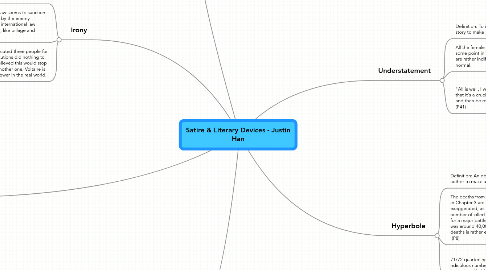
1. Allusion
1.1. Definition: A passing reference to another literary work
1.2. In his memoirs, Voltaire wrote about when he witnessed the punishment of deserters in the Prussian army, and how a French nobleman forced into service had to endure the same treatment before Voltaire intervened.
1.2.1. "To run the gauntlet thirty-six times" P7
1.3. He could be referring to Montesquieu's Spirit of the Laws in which he condemns slavery and the price of blood in which a barrel of sugar is paid for.
1.3.1. "It is the price we pay for the sugar you eat in Europe" (P52)
2. Irony
2.1. Definition: Use of words to demonstrate the opposite of the literal meaning
2.2. This is rather ironical because international law seems to sanction the massacres that happen in villages taken by the enemy. Voltaire is mocking the fact that theorists of international law justified things that the law could not forbid, like pillage and slavery.
2.2.1. "It was an Abar village which the Bulgars had razed to the ground, in accordance with international law. (P8)
2.3. This is ironic because although the Inquisition executed three people for rather trivial reasons, including Pangloss, the executions did nothing to stop another earthquake. Although the Church believed this would stop the earthquakes, it almost seems like it brought another one. Voltaire is criticizing the Church's lies and its actual lack of power in the real world.
2.3.1. "That same day the earth quaked once more with a terrifying din." (P16)
3. Parody
3.1. Definition: Humorous imitation of some other work that mocks and/or makes fun of it.
3.2. Voltaire is parodying Leibniz's philosophy by introducing Pangloss, who seems to switch the cause and effect (no legs without pants) and serves to ridicule that philosophy by providing counterexamples.
3.2.1. "He could prove to wonderful effect that there was no effect without cause" P4
3.3. Voltaire is parodying the Bible and its long and complicated genealogy. He might be criticizing the fact that the Bible contains so many examples of children born of wedlock and so it might be hypocritical to stress religious fidelity.
3.3.1. "'What a strange genealogy is this! Surely the devil is its source?"
4. Oxymoron
4.1. Definition: A self-contradictory phrase, like "make haste slowly"
4.2. The phrase is contradictory because it seems rather wrong for such acts of butchery detailed in the chapter to be "heroic". Voltaire seems to be criticizing those who treat the act of war as heroic, although it is extremely violent and bloody.
4.2.1. "heroic butchery" P8
4.3. Rather contradictory, as harmonies aren't generally played in hell. So I interpreted this as meaning that while the people hear the sounds of battle as a glorious harmony, it's actually gruesome and horrible enough to have never been heard in hell itself.
4.3.1. "Trumpets, fifes, hautboys, drums, cannons, formed a harmony such as never been heard in hell." (P7)
5. Understatement
5.1. Definition: To intentionally downplay a fact or story to make it seem less significant.
5.2. All the female characters are all raped at some point in the book, but all the characters are rather indifferent to it and think of it as normal.
5.2.1. The old woman wouldn't have mentioned her ordeal if Cunegonde didn't provoke her, showing that the old woman treats her ordeal of rape on the level of a minor event, which it isn't. (Chapter 11, P31)
5.2.1.1. Voltaire is satirizing the fact that rape and other atrocities in the world have become so common that people treat them so
5.3. "All is well, I won't argue about it; but I must admit that it's a cruel fate to have lost Lady Cunégonde and then be roasted on a spit by the Oreillons." (P41)
5.3.1. This is an understatement made by Candide, as he is about to be roasted to death yet he still says "All is well." Candide is again, showing how foolish Optimism can be, and how the world is definitely not the best of all possible worlds as Candide has gone through so many hardships.
6. Hyperbole
6.1. Definition: An obvious exaggeration by the author to make a point
6.2. The deaths from a single battle in Chapter 3 are rather exaggerated, as the total number of killed AND wounded for a major battle like Waterloo was around 40,000, so 30,000 deaths is rather exaggerated. (P8)
6.2.1. Voltaire is ridiculing the lack of concern the leaders have about the massive casualties war brings.
6.3. 71/72 quarterlings in a coat of arms is a ridiculous number, since the requirement for knighthood is 16. (P3, P112)
6.3.1. Since the Baron refuses to let Candide marry Cunegonde because of a difference of one quarterling, and seeing how they have an extremely high number so that the different wouldn't matter, Candide is mocking the disputes nobles often have about minor things.
